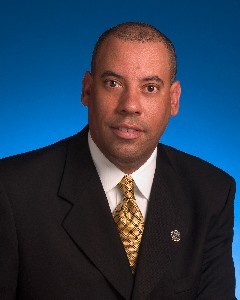Among the most intriguing revelations made to members of the Rotary Club of Memphis on Tuesday by Tennessee Bureau of Investigation director Mark Gwyn was that
the T.B.I., the Volunteer State’s equivalent of the F.B.I., originated in a newsman’s imagination.

TBI Director Mark Gwyn
This was John M. Jones, the longtime publisher of the East Tennessee Greeneville Sun, who, while covering a murder at some point in the 1950s, became so incensed at the way local police had mucked up the site of the crime (“contamination of evidence,” we call that these days) that he lobbied then Governor Frank Clement for a state-run professional investigative agency. Clement in turn went to work on F.B.I. director J. Edgar Hoover, who gave the idea his blessing, and — voila! — the T.B.I. came to be.
In those days, the agency had but three employees — one for each of the state’s Grand Divisions — but when then Governor (later prison inmate) Ray Blanton began being accused of crimes of his own in the late ’70s (selling gubernatorial pardons and liquor licenses) and siphoning off agency records, the climate was right for the next Governor, Lamar Alexander, to oversee the expansion of the T.B.I. to its present dimensions as a fully staffed and independent investigative unit, with criminal and forensic divisions of various kinds, all armed with up-to-date technology.
And, as Gwyn explained to his luncheon audience at the University Club, the agency’s directors are appointed to six-year terms in cycles designed to make them independent of specific gubernatorial regimes. (Gwyn himself, originally appointed by former Governor Phil Bredesen, is now in his third term.)
The director addressed three areas of principal concern for the T.B.I — drug trafficking, human trafficking, and cyber crime — all, as he maintained, currently on the rise.
Gwyn claimed credit for a crackdown on methamphetamine production in the state that has reduced the number of meth cases from well into the thousands down to a few hundred. He said the newest specter in Tennessee is heroin and, beyond that, in street doses of heroin cut, in potentially lethal proportions, with the painkiller Fentanyl. (Tennessee has for many years ranked first or second among the states in opioid addiction.)
As for human trafficking, the T.B.I. — commendably — has a policy of regarding young women entrapped into sexual servitude more as victims rather than as criminals, and the agency’s investigative efforts are focused on pimps and customers.
Gwyn came off more as a traditionalist than as an idealist, however, and he got a bit of audience reaction to his statement that he still regards marijuana as a gateway drug as well as to his questioning of legal protections currently enjoyed by users and manufacturers of cell phones — as in the famous Apple case involving the contents of an accused terrorist’s iPhone.
Those are both cutting-line issues, and how they’ll be resolved is still to be determined. But we appreciate Gwyn’s candor and willingness to discuss these points publicly, as he did on Tuesday.